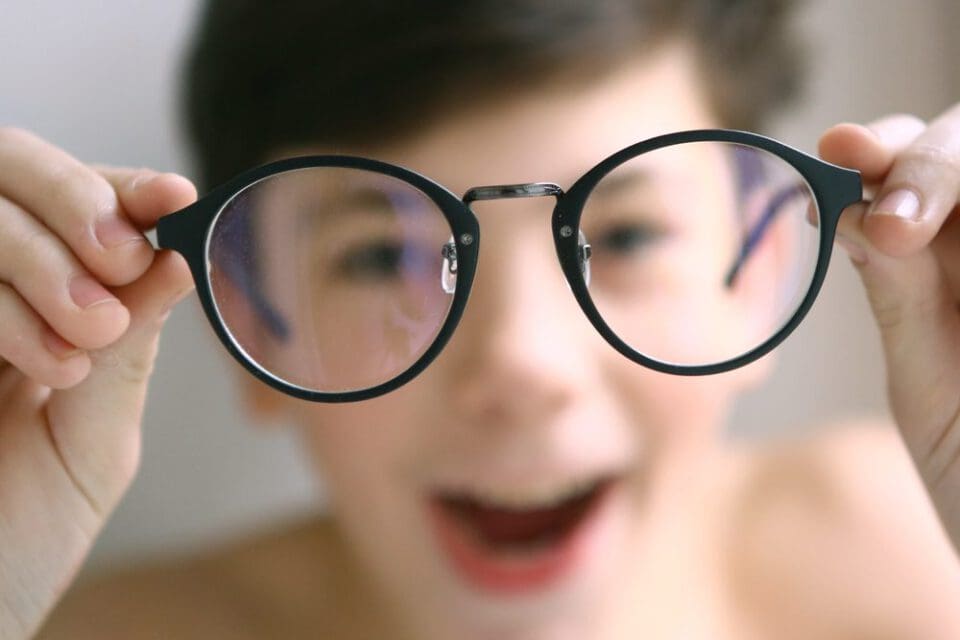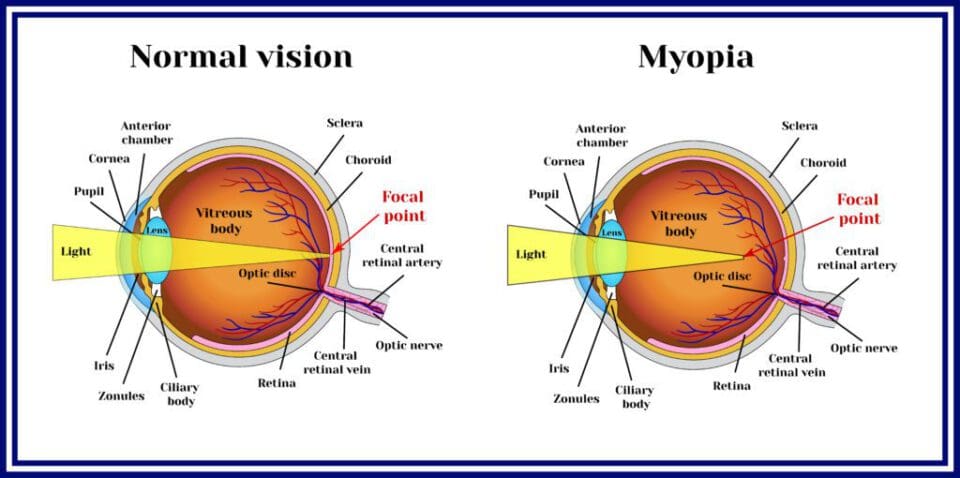Further Reading
Can Glasses Actually Make Your Vision Worse?
Home / Everything About Glasses /
Last Updated:
Many people mistakenly believe that wearing glasses can make your vision worse.
Some people believe that wearing glasses makes your eyes rely on them, so the muscles that cause your lens to focus atrophy, and your vision will get worse faster. Others believe that wearing the wrong prescription glasses can damage your sight. Both of these beliefs are incorrect.
Table of Contents
Refractive errors will progress regardless of whether you wear glasses or not, but wearing glasses means that you can see better. When adults wear the wrong prescription, it may cause eye strain, but it will not hurt their vision. However, if children wear the wrong prescription, it can make myopia progress faster.
Regardless of your age, getting the right prescription to correct your vision improves your life.

Does Wearing Glasses Make Your Eyesight Worse?
Wearing glasses does not make your eyesight worse; instead, they correct changes in your vision due to refractive errors like nearsightedness, farsightedness, and astigmatism. These changes occur as the lens inside the eye alters shape, meaning that light doesn’t clearly reach the retina. As a result, images processed by your brain may be blurry or doubled, leading to eye strain or headaches.
Myopia, or nearsightedness, commonly begins during childhood, while presbyopia, or age-related farsightedness, starts over age 40, affecting most middle-aged adults.
You deserve clear vision. We can help.
With 135+ locations and over 2.5 million procedures performed, our board-certified eye surgeons deliver results you can trust. Your journey to better vision starts here.
Getting glasses means adjusting to these changes in eyesight. The lenses in glasses assist the eyes in focusing light properly on the retina, alleviating symptoms like blurriness and discomfort. It’s a corrective measure to support the eye’s natural functions, not a cause of further deterioration.
The majority of the population will develop some type of refractive error in their lives, needing corrective wear like glasses to assist their vision. Misunderstandings about how glasses work have led to mistaken beliefs, but the truth is that wearing glasses is a helpful tool in vision correction and not a contributor to worsening eyesight.
The Myths About Glasses and Visual Acuity
There are two pervasive myths about glasses that must be dispelled.

- Wearing glasses weakens the eyes. Some people believe that forcing the eyes to focus without assistance will strengthen the muscles around the eyeball and keep refractive errors from progressing quickly. This is untrue. It can lead to eye strain and fatigue in adults, and it can worsen refractive errors, particularly myopia, in children. Glasses actually adjust for the lenses inside your eyes, adding a level of refraction to sharpen the image processed by your brain.
- Wearing glasses weakens the eyes. Some people believe that forcing the eyes to focus without assistance will strengthen the muscles around the eyeball and keep refractive errors from progressing quickly. This is untrue. It can lead to eye strain and fatigue in adults, and it can worsen refractive errors, particularly myopia, in children. Glasses actually adjust for the lenses inside your eyes, adding a level of refraction to sharpen the image processed by your brain.
- Wearing the wrong prescription eyeglasses can damage the eyes. It can take a few days or weeks to adjust to new glasses. If you still cannot see well with your glasses after a few weeks, your prescription may be too weak or too strong.This happens sometimes, and it can cause headaches, eye strain, and fatigue. However, for adults, it is nothing to worry about in the long term. Getting the correct prescription means that you suffer less eye strain. In children, wearing the wrong prescription can increase how quickly the refractive error progresses, so it is important to get the most accurate lens prescription possible.
Why Glasses Are Associated With Worsening Vision
Some people believe that wearing glasses can lead to atrophy of the muscles around the eyes, and that forcing your eyes to focus without glasses, or with a lower prescription than you need, can prevent refractive errors from progressing. Although this is an incorrect association, the misconception makes some sense.
The natural lens of the eye can change shape to adjust how much light hits the retina, and the shape of the lens changes due to flexing ligaments called zonules. As you age, these ligaments become slack while the lens becomes harder. This combination means it is more difficult for your eye to focus light correctly on the retina.
It is tempting to believe that exercising the zonules and ciliary muscles around the eye will keep your visual acuity clearer for longer, but this is not true. Permanent changes to the lens shape have a greater effect on visual acuity, and exercising these muscles cannot train your eyes to reshape the lens enough to see clearly. Presbyopia, or age-related farsightedness, is not worsened by wearing reading glasses.

appropriate corrective wear, like glasses, can worsen myopia’s progression if they have to squint at distant objects. Often, children will self-correct for myopia by holding books close to their face or sitting closer to the television. These behaviors have also been associated with causing vision to become worse, but the actual link is the opposite. They can instead indicate that your child needs glasses.
Regardless of the type of refractive error you have, your eyesight will get progressively worse. Wearing glasses or contact lenses does not cause your refractive error to progress. Worsening is simply an aspect of these eye conditions.
Keeping up with your glasses prescription means that you will continue to see clearly, thanks to lenses that are customized to your vision needs.
You deserve clear vision. We can help.
With 135+ locations and over 2.5 million procedures performed, our board-certified eye surgeons deliver results you can trust. Your journey to better vision starts here.
What Happens When You Wear the Wrong Glasses
If your glasses are the wrong prescription, in either direction, you can develop eye strain. Symptoms of eye strain include:

- Soreness in or around the eyes.
- Itching or burning eyes.
- Dry eyes or excessive tearing.
- Blurry or double vision.
- Persistent headaches.
- Soreness in the neck, shoulders, or back from poor posture to correct for vision problems.
- Trouble concentrating.
- Feeling like you cannot keep your eyes open.
- Feeling fatigued.
There are several causes of eye strain. Improperly corrected vision and uncorrected vision are two reasons you may be struggling.
In adults, eye strain does not make refractive errors progress faster, although it can be uncomfortable in the short term. In children, uncorrected or poorly corrected refractive errors can get worse because of eye strain.
Children Need Prescriptions That Fit Their Eyes

Myopia is the most common refractive error, and it begins in childhood. Two more recent studies have concluded that giving children the correct prescription for myopia slows the progression of this eye condition instead of trying to strengthen their eyes by forcing them to squint without the correct prescription.
The longest ever follow-up study on people with myopia, which started in 1983 and concluded in 2014, found that study participants who wore the correct glasses prescription had a slower myopia progression compared to those who had slight undercorrections. By adulthood, everyone with myopia in the group had to wear glasses all the time to see clearly, with no statistically significant variation in refractive error or visual acuity.
The study shows that undercorrecting myopia does nothing to improve long-term outcomes, and in the short term, eye strain in children can make vision worse faster. Children should be given the correct prescription glasses the first time.
Glasses Improve Your Eyesight

Working with an optometrist or ophthalmologist every couple years can keep your visual acuity high. Your eye doctor will track the progression of your vision problem and prescribe new lens strengths as needed.
There is a familiarization period of up to two weeks after you receive a new prescription for glasses, during which your brain becomes used to processing images. Your eyes may feel a little tired and your vision may be blurry or doubled, but this is normal during the first few days or weeks. If the problem continues, go to a follow-up visit for a change in prescription.
Glasses only improve your vision, and your refractive error does not worsen because you are wearing corrective lenses.
You deserve clear vision. We can help.
With 135+ locations and over 2.5 million procedures performed, our board-certified eye surgeons deliver results you can trust. Your journey to better vision starts here.
References
- Facts About Refractive Errors. (October 2010). National Eye Institute (NEI), National Institutes of Health (NIH).
- Ophthalmology: Myths and Facts. Mayo Clinic Health System.
- By the Way, Doctor: Will Wearing Glasses Make My Eyesight Worse? (December 2010). Harvard Health Publishing, Harvard Medical School.
- Five Vision Myths. (June 29, 2012). American Academy of Ophthalmology (AAO).
- Eyestrain: Overview. (October 28, 2018). Mayo Clinic.
- The Progression of Myopia from its Onset at Age 8-12 to Adulthood and the Influences of Heredity and External Factors on Myopic Progression. A 23-Year Follow-Up Study. (December 2014). Acta Ophthalmologica.
This content is for informational purposes only. It may have been reviewed by a licensed physician, but is not intended to serve as a substitute for professional medical advice. Always consult your healthcare provider with any health concerns. For more, read our Privacy Policy and Editorial Policy.